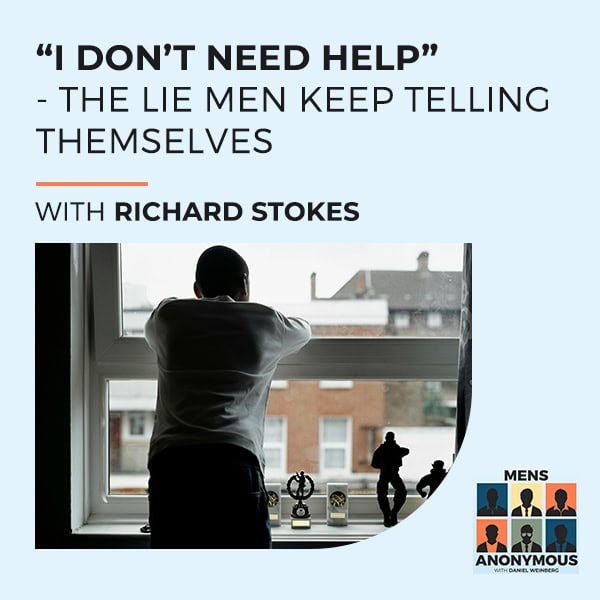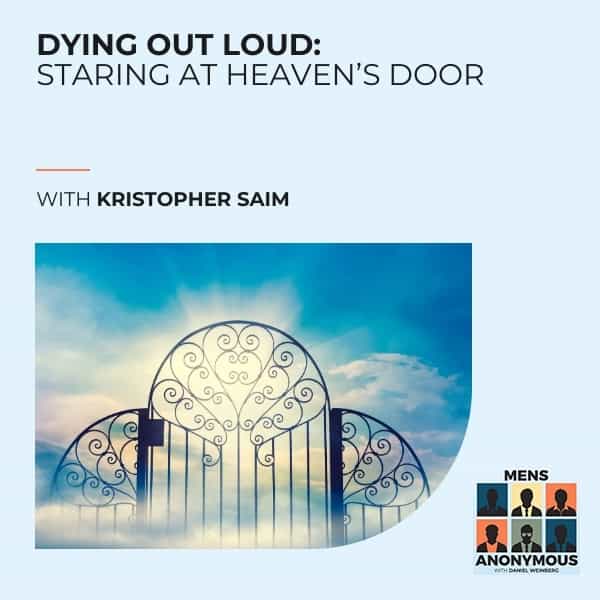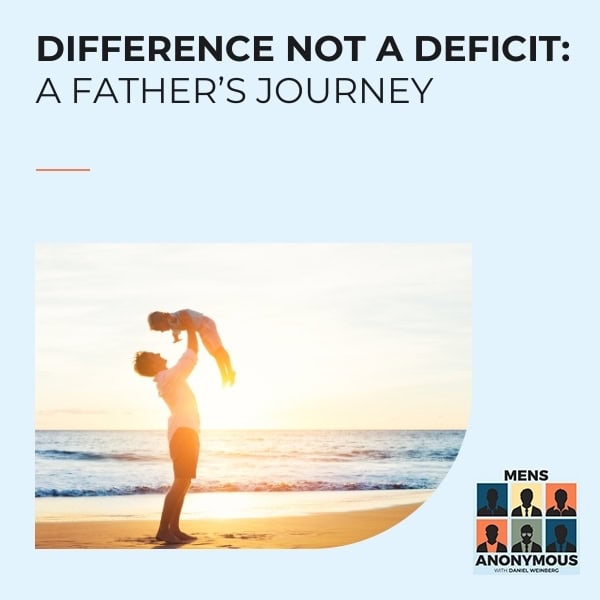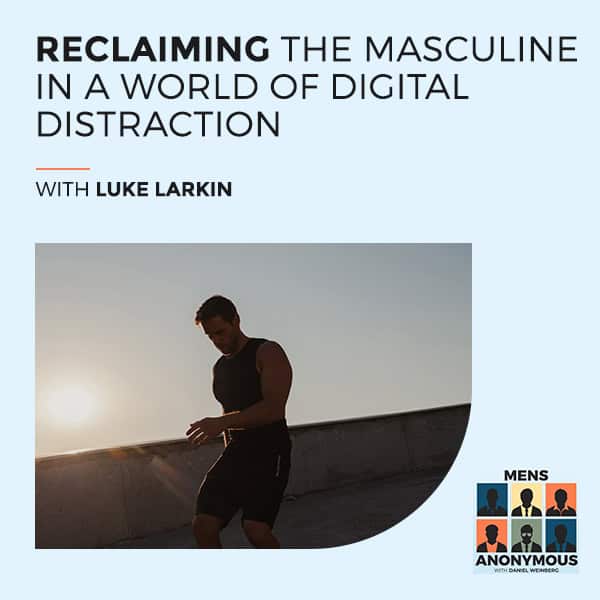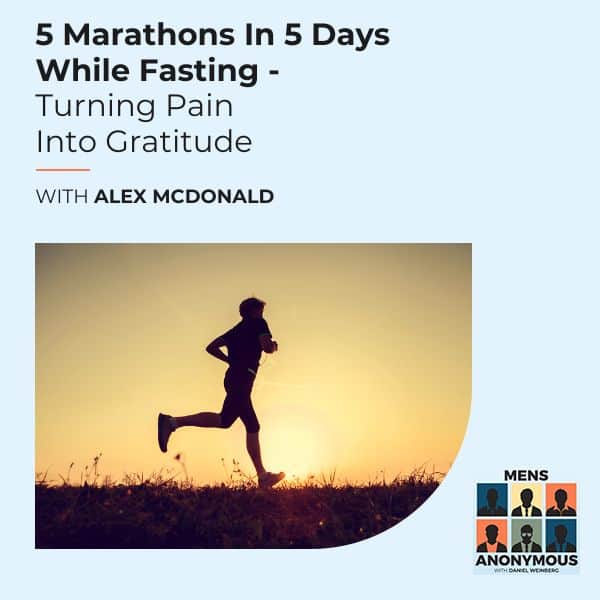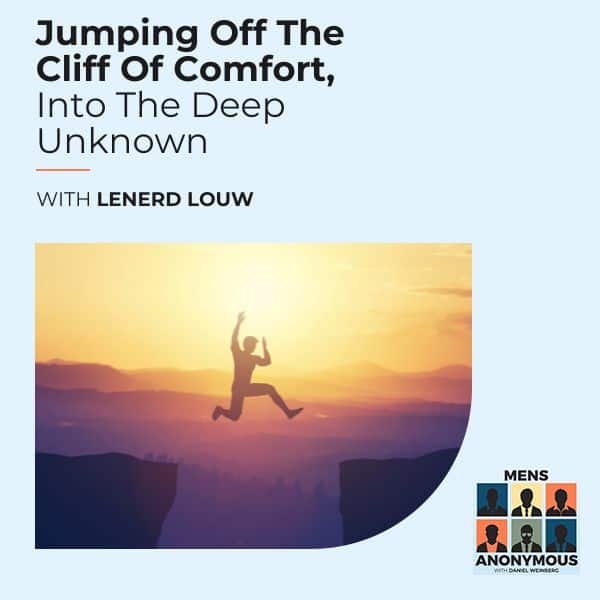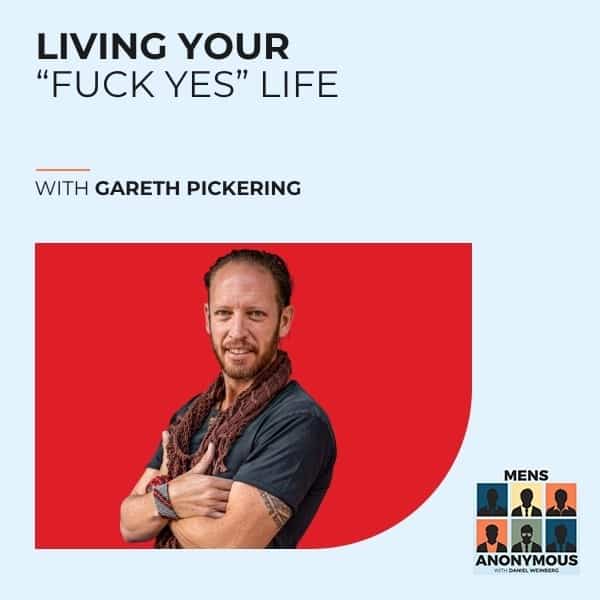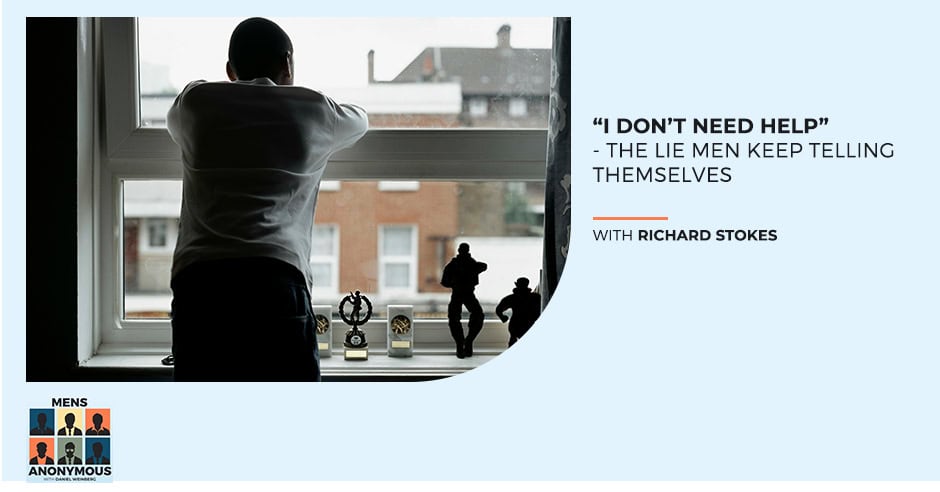
It is often hard for leaders to embrace their fears and weaknesses as they mostly rely on their strength and resilience. But they must seek refuge in a safe space and become vulnerable if they truly want to achieve growth. Daniel Weinberg chats with Richard Stokes, a renowned leadership coach, to discuss how he offers men a chance to open up, connect, and support each other through Mojo Leadership. He explains how one-on-one coaching and workshops can help men shake off their bravado and dive deep into profound transformation as effective and inspiring leaders. Richard also shares about his move to the United Kingdom, what it is like to be raised by a single mothers, and his years in advertising.
—
Watch the episode here
Listen to the podcast here
Richard Stokes
Introducing Leadership Coach Richard Stokes
Richard, welcome. Thanks for coming on the show.
It’s fabulous to be here, Daniel. Thank you for having me.
My pleasure. Where are you right now? What’s your location?
I’m based in Ibiza Spain. Probably tough my accent. I’m not from Spain originally. I’m from the UK, but we have been living here for about six years.
They call it the magical island.
It is. It has a magic and energy that some people try to define, but you feel it. It has an energy like I have never experienced anywhere else. I have certainly lived.
The famous spot there is the Es Vedra, which they say has a very high electromagnetic field.
The third most magnetic place on Earth, and there are lots of things. There are a lot of crystals here. There are ley lines, connection points, and the history of the place when the hippies arrived in the ‘60s and ‘70s, they brought a whole different way of being, a way of thinking. A power here for sure. I’m tuning into that right now.
It’s one of my favorite spots in the world, without a doubt.
I’m grateful every day for living here.
You are not Spanish. Why don’t we start with a little bit of your origin story, of what your path or journey has been, and then we will take you to Ibiza and then we’ll go from there?
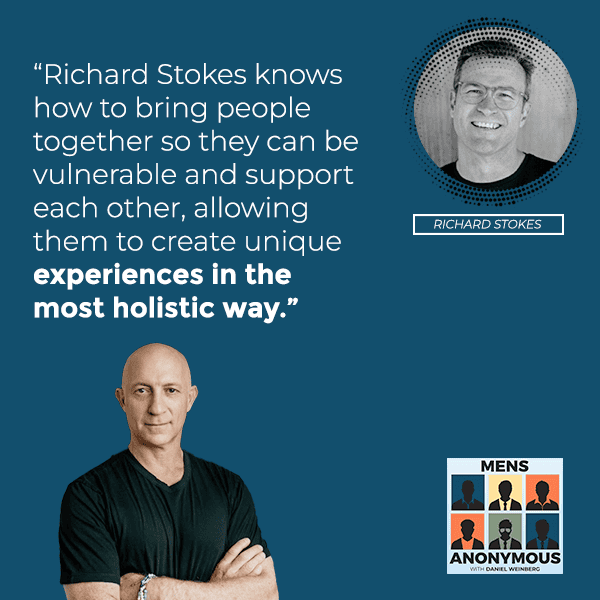
It’s interesting living abroad now, and my two sons, I will talk about a lot, born here abroad. I was also born in foreign parts. I was born in Kenya, in Africa in the ‘70s. I lived there for a couple of years and then moved to Dubai in the Middle East. Dubai is unrecognizable from how it is these days. It was a couple of buildings along a creek and a port where my father worked.
Start with Kenya. Why was your family in Kenya?
My father’s work, he was trained as a naval captain, ship’s captain at this point. He was working within the port in Mombasa, which is the second city in Kenya, and he was working at the port there as a port pilot. The guy that brings ships in because he knows the local area. We lived there for the first two years of my life, and then this opportunity came in Dubai.
You are a Kenyan passport?
No, British passport. British parents, so no. I’m not even sure I could, I don’t know, maybe. I have never even investigated that. It might be more valuable than a British passport now.
You did something similar.
In Dubai. They were establishing Dubai. In context, it’s the mid to late ‘70s. A very different place, but they were establishing the growth that everyone’s seen happen in Dubai, and my dad was a part of the early part of that, and then a key point in my life, sadly, my parents separated and divorced when I was around five. As everyone will know, it’s a very early point for that to happen. It’s left a lot with me and a lot of trauma that hangs on from that. For sure. My father stayed in the Middle East and I moved back to the UK with my mother, and we moved to the southeast of the UK. I would only be seeing my father every school holiday at that point.
This was pre-FaceTime and WhatsApp. I have five kids that I live separately away from. I talk to them individually, every single day, and I see them on a much more regular cadence than would have been back. They just, because it would have been very challenging to do that.
It is very difficult. Even phone calls at this point. International phone calls were incredibly expensive and very difficult.
It is very difficult to engage the visual.
As a young child with the use of the phone, “What’s that about? I didn’t like that at all.” That’s a big point in any person’s life and not, at least for me. I moved back to the UK and then went through the school system, as you do relatively unremarkable, but brought up by a single parent. Me and my mom are working very hard as a nurse in an operating theater. I learned from a young age, a lot of independence, a lot of needs. You are self-reliant.
You are a latchkey kid.
I would come home from school at 3:30. She might come home if it was a daytime shift at 5:00. She worked night shifts sometimes as well. She’d have to trust me that in the early stages, I had a baby sister. I’m trying to think in context to the ‘80s, things have changed. From the age of 11 or 12, I would be by myself all night.
No siblings as well?
Yes. No siblings. Key point. I have stepbrothers and sisters who I’m very close to, but no blood brothers and sisters. Only child. It’s almost mad thinking about it. I will be by myself in the house. My mum would do a night shift, not all the time, occasionally to fill in for people, and I dealt with it. She’d leave me some dinner, I’d have that, I’d watch a bit of TV, and take myself off to bed. Didn’t go crazy. There’s a lot of responsibility given and accepted at that relatively tender age. A lot of self-reliance. One of my key values is that sense of self-reliance, of being able to look after and take care of myself, which I have to do a lot of.
Self-reliance and resilience.
At one stage, we didn’t know what resilience necessarily was when you were talking about it at that age, but they certainly, in many ways, stand you in very good stead. I’m also very aware of some of our values. We can overplay them, and my self-reliance value is one I have to watch. I overplay it. I can get a little bit distant. I don’t call people for help. “I don’t know,” or, “Can you help me with this?” I will deal with it myself, which, again, is a very masculine trait as well. That, “I’m going to go into the cave and I’m going to sort this out, work this out myself.” I have to notice that in myself and nudge myself forward that there are some people here who can help me, who love me, who want to support me.
It’s that male default of, “I need to show strength.” Asking for help, that’s a sign of potential weakness.
The classic. You are driving around, maybe pre-GPS, lost. “Should we ask someone for help?” “No, I will find it. I will work it out.” Your wife is getting more and more mad at you. Ask someone for help. It’s a classic.
Richard’s Relationship With His Parents
I’d like to talk a little bit about your relationship with your father and your mother growing up and what it’s like.
Sadly, my mother passed away. My father’s still going, still. He’s 80. Relatively fit, I have to say. Could be healthier. This is somewhat of a challenge when you get to a certain point in life. I have got young children, and I have got an aging parent, and you are looking both ways, trying to take care of both, which can be a bit of a stretch.
For context, brought up by my mother, as I have alluded to. We’d see my father mostly during school holidays. Importantly, we’d always have a long summer holiday. I’d spend most of 4 or 5 weeks with my father, stepmother, stepbrothers, and stepsisters. I had that.
Where?
In Spain. They owned an apartment in the north of Spain, and that’s where we’d do summer break. We’d all troop down there on a long road trip, like a two-day road trip. This is the Costa Brava in northern Spain and we would fight like cats and dogs in the car, and then that would carry on when we got to the place. There’s no space around. I was used to my own space. You can imagine growing up as an only child, and then all of a sudden, I’ve got to share space, toys, food, and different rules. They are like a different culture. When you are 11, 12, or 13, trying to work that out for yourself takes some doing. This is the 1980s. Not a lot of emotional intelligence necessarily from my father and my stepmother as well. It was like, “Get on with it.”
Did you feel that you were treated equally as your step or half siblings?
Step siblings. Mostly. They did a good job of not trying to show preference, and even the opportunity to come on this holiday, which we did for 5 or 6 years back to back. That was an important part of that because it could have been, “Richard’s not going to come on this,” but I was invited to join in, and that was an important part of my growing up. Fast forward many years, and I have a good relationship with my stepbrother and two stepsisters. We got exceptionally well.
Relationship with Dad?
We’re getting into it now, Daniel. We have come a long way, I would say interesting.
Did you blame him for your parents’ separation?
Yeah. Internally. Never having it out. Never express that anger, that angst that you are holding as a young man.
You never spoke to him growing up and said, “Why did you leave?” or “What happened?” or “Why did you abandon me?” or any of those?
Not in that direct, almost confrontational way. I am now fully in my mind. My mother was very hurt by the whole separation, and divorce process. I had her side of that in my ear every day.
She was angry about it.
My stepmother couldn’t use her name for about five years. It would be, She’s like, “It’s the other woman.” For me, it was like, “Maybe this is normal.” It’s not, but having that all the time, that angst it was hard.
Did you feel guilty when you were enjoying the company of your stepmom and that family?
No. I don’t recall feeling guilt about that, or maybe that faded when I got into my teenage years. I don’t remember that feeling. When I was 7 or 8, there was a, “What am I doing here? What’s going on?” As a kid, what do you do? You play. You just, “What are we going to do together then? Let’s play.” We were all very competitive, and and very athletic. We’d be racing each other and er, playing tennis, and that was a way of expressing something to ourselves and each other. That’s why I enjoyed it. I enjoyed being around these step-siblings. I don’t remember the guilt.
What do you think you missed out on not having a father figure in your life as you developed into a young man?
One can say I missed out on a huge amount, and one can say I have developed into exactly the person I should be. Not a question I dwell on all the time, but if you could rewind time, which we can’t, would I want to change that? Would I want to have been brought up with a very present mother and father? Yes, because that’s what I’m doing now. That’s what I’m doing now, and that’s my choice.
I developed pretty well considering my mother put a lot of effort work and focus into trying to get me as much as I could. She was a nurse, not well-paid, but we’d go on holiday. She’d get me what I could have. I never felt a deep sense of lack. I had a sense, and this is something you hold as a young person, that I’m not going to now ask for that thing because I don’t think we can afford it.
When you are unaware of that, you might be asking and pushing, “I want this, I want that,” and then you get to a certain point. I can’t tell you what age I was, but there’s a certain sense where awareness comes in. I’m not going to ask Mom again for those trainers because I know I’m not going to get them. You again compartmentalize, probably push it down, and process it in your way.
Did your relationship with your mother move from a mother-son normal, traditional relationship to almost like a partnership in a household, where there’s a male and a female and she needs to rely on you for things? You almost become like friends, partners beyond mother and son. “You are the mother, you take care of me.” It was like, “We are taking care of each other there.”
From probably 15 to 16, providing emotional support, but through to, sadly, when my mother passed away. I’d be speaking to her most days, if not every day most of my adult life. I never lived that close to her. She’s in a small town, and I wanted to get away from that small town. I went away to university. I moved to London. I have traveled around the world doing all the things that I wanted to do. That creating or giving that emotional support was part of the deal. I know she wanted it, and I was like, “I can give that.”
Discovering Purpose In Coaching
Career-wise, college, moved to the big smoke, went to London, and what did you pursue? What was your thing?
I did a degree in politics at university, which was not a stepping stone to being a politician. That’s not what I wanted to do. I enjoyed the study. What I wanted to do was move to London. After a few trips, I lived in Spain for a bit. I lived in Australia for a year, which was amazing. I was all over. Sydney and Brisbane mostly. I had a great time traveling around doing all sorts of jobs. I was Santa Claus at David Jones department store in Sydney. That was the peak. That was very well paid.
I have got this, Daniel. It was Christmas 1996. The Australian newspaper, which is still going. Christmas Eve, 1996. I appeared on the front page of The Australian newspaper in my full Santa regalia. This little girl on my lap screamed at me, “Who’s this guy?” I remember this photographer turning up, taking some photos, and when this happened, he had this massive look on his face going, “This is the photo.” I wake up the next day, and this girlfriend I was with at the time goes, “Check this out,” and I’m on the front page of the newspaper.
All sorts of jobs to keep me in Australia. I had this, “It’s time to get serious now, Richard. It’s time to find a career,” which I didn’t have. Maybe going back to your earlier question about having a father figure around, maybe that who knows? Does that galvanize you a bit more in the direction of thinking about a career a bit earlier on? I was a bit more, “I will do what I enjoy,” and then I did get myself into a place of, “No, it’s time for a career.”
I started in the advertising space. I got a graduate job with an ad agency. I loved it and found I was good at it whether it was talking to clients, thinking about strategy, or being creative. A lot of those elements. Nothing to do with my academics at all. Talking about tribes a little bit, I found my tribe. I found a group of people I liked hanging out with. It was very sociable. This is now the 1990s London. Super fun. We worked hard and played hard. It was that classic balance. Sometimes the balance was off, but that’s where it was. A very different time in the office, obviously five days a week, no matter what. Often Thursday nights were a particularly popular night for everyone to go out to parties and exuberance.
You had to be at your desk at 9:00 on Friday, whatever state you are in. Sometimes you might not even get home. Maybe you had to come and be there. That presenteeism was insane, but that was the thing. That was the culture. A lot of fun, and I stayed in that industry for the best part of 25 years. A long time. I worked in London. I worked in Eastern Europe for a while. Traveled the world, had global roles in the latter years, and always had a sense of, “I like this, but I don’t think it’s me.”
Imagine that for 25 years, holding onto an “I’m enjoying it but.” There was always the “but” in my head. I was very fortunate that my last employer, a big advertising holding group called WPP, invested a lot in coaching to support their senior talent. I had a couple of different coaches and went on a couple of leadership programs, and it opened my eyes and mind to the human condition, and our potential.
This is incredible. I love this. I never studied any of this stuff. Bits and bobs within politics and psychology, but not in depth. I thought maybe there’s something in here. Maybe I could create my next step out of this. I went and put myself through a coaching training program over the course of a year. I invested my own money behind it and found that I loved it, and again, it appeared to play to my strengths. Then it was like, “What do I do with that?”
What was the appeal to you of coaching and the actual discipline of coaching? What did you see in it that sparked something inside?
It was the way I was able to sit with either another person or people in a team setting and support their development. When I traced back to when I looked at the twenty-odd years I spent in the advertising business I felt fired up by things, I was maybe training people, I was bringing people together, I was holding workshops. That’s when I was like, “I love this.” It went from, “I quite like this fun job” to “I love this.” I had these peaks. It’s useful.
This is a process I get my clients to do. To look back at where you’ve had those peak moments and go, “What was going on there?” Maybe you were really happy, you were proud, you were fulfilled. What was going on? For me, it was that. I started to join the dots a bit and go, “If I do this training program, maybe I could create something.” The other itch to scratch had been, “I’ve spent 25 years working for a relatively big business. Why not do something for yourself, Richard? Why not step out?”
Which is always a big move.
I wasn’t without fear and apprehension about it. I went in and out for a while. “Am I going to do this?” I’m so thankful that I did. It’s almost that when you’re about to commit to something, it’s knowing that fear is going to come up, and that fear is important. When you see that fear, you’ve got to keep going because the fear isn’t in the way. Fear is the way. That’s what I’ve got to go at. I’ve got to go at that.
When you are about to commit to something, fear will come up. Nevertheless, keep moving. Share on XYou are also at a stage of life where it’s not just you, Richard. You have a wife, you have kids, you’ve got other responsibilities.
This wasn’t, “It’s going to change everything for me.” It was a deep conversation. I’m very fortunate to be married to my wife, who’s amazing. I’d supported her through a career change. She went from the same industry I had been in, advertising to teaching. We’d done that a few years before, and then it was my turn to go through my transformation, and she was hugely supportive. At the same time, because these things worked hand in hand, we moved to Ibiza when I stepped out of my corporate job and into running my coaching business exactly at the same time.
What was the catalyst for you moving to Ibiza?
The catalyst for that was the desire to start a family, and that was our thing. To be frank. We’d struggled for six years of disappointment. Anyone reading who has been through any infertility journey or IVF. It’s incredibly difficult. I do look back on that and go, “It’s amazing that we stayed together through it,” but we had that belief that we’d get there in the end.
We were in London, and it didn’t seem like it was going to happen here with this child that we knew was going to come at some point but didn’t want to come here. We thought, “Let’s change the environment a bit,” and Ibiza, as we spoke about at the beginning, is a beautiful place. We spent the holidays here. We didn’t know it exceptionally well, but we had a sense of nature, the calm, and the energy, and we thought that could be the place.
We changed things around in terms of some of the IVF processes we were using. Within a year and a half of being here, Noah, our oldest son, was born here on the island. Again, we feel blessed every day that we made that decision. He’s here and was joined three years later by his brother, Rafa. I’ve got two beautiful boys.
How Richard’s Parents Influenced His Romantic Relationships
I like the names. I’m going to jump around a little bit. I want to go back to how you think about the dynamic in which you grew up with your parents separating at an early age, being raised by a single mother, latchkey kid. How did that influence the relationships you had both your romantic relationships and also the forming of your male tribe, your mates? It sounds like you are very self-reliant, not wanting or needing anything from anyone else, yet working it out yourself. How did that influence you like the forming of friendships and male friendships going into your later life, and also the way you selected your female relationships?
Good and healthy female relationships, girlfriends from when I was 17 or 18, that point which is quite, I don’t want to say normal, but quite standard. I then got married for the first time. I have been married and divorced when I was 29, and that was quite early in my peer group. I was the first one of us to do that. My wife at the time, was 26. We were quite young. We’d met and fallen in love, having a great time living in London, and we were like, “This is what you do. This is what you do next.”
The thing I look back on and we divorced after 5 years of marriage, 7 years being together, as amicably as you can I would say. It was her energetic push, but she read it correctly. I do thank her for that. It was a good call, and thankfully, before we had kids. The challenge was, again, going back to not growing up with a mother and father, I didn’t know what a healthy marriage should look like. I had no real sense. A lot of this is thinking back on it. I had no real role models to look at.
Who was your source?
I don’t think I had that. There’s a bit, maybe, from your friends’ parents, maybe some family culture, but I’m not sure culture is always the best role model, especially popular culture. I look at it and go, “I didn’t have it.” Again, my self-reliance bit, where it negatively impacted me when things started to go a little bit off. “I didn’t ask anyone for help.” I didn’t go, “Dad, I’m having this weird thing with Nikki, my ex-wife. Give me some advice on that.”
I didn’t have the capacity to do that, neither with my friends. I have close friends, mostly from university. There’s a bunch from there. Then there are some key ones from the world of work, and now lots here in Ibiza. At the time, with that group, I didn’t feel I could reach out and get help or support for what was starting to go on. Then six months later, we were like, “That’s it. We’re done.”
I spent most of my conversations explaining to my friends and family, “This very happy marriage that you remember, It’s done.” People were properly shocked. It’s classic looking from the outside, it looks rosy, and on the inside, it’s, “What happened?” We’d grown very stale because we didn’t have what I have learned in the last few years, thankfully, which is the need for the polarity between the masculine and the feminine. That push. That energy is created from it.
There is a need for polarity between the masculine and the feminine. Share on XI do look at my first wife, Nikki, an amazing woman. She was probably more in her masculine, and that put me into my masculine. Essentially, we became friends. That is not a basis for a romantic relationship. When you get to that friend’s place the juice is gone and I can’t see it coming. There was an opportunity. If I’d known some of this stuff or had some of that input, maybe we could have done something about it. We got to a point where it was like, “We’re cohabiting as friends now, aren’t we?” That’s done.
Glorified housemates.
That’s what we got to. It was an amicable split. With my now wife, we have this amazing masculine-feminine polarity. She’s way more feminine, all that’s connected, all that sense of love and that thing. I know now where she needs me to be in my masculine. If I go and try to match her where she is, the juice is gone. She needs me to be where I am, and I’m not talking about those unhealthy, negative views of masculinity. I am appalled by all of that. Being a healthy, conscious masculine is an amazing place to be, and that is where the feminine wants you to be. To hold space for her, to make sure that she can feel safe to be herself and fully express herself. I’m so conscious about that. That’s the dance. That’s where we are.
You’ve just hit the nail on the head there. It’s the polarity that needs to exist, but it’s the two of you being very consciously aware that the polarity needs to exist and, therefore, making sure that you facilitate or create that polarity. Make sure that you don’t neutralize it by swinging one way or the other too far, thinking that’s what’s needed or required, where you’ve said it very clearly.
That’s a consciousness that I got to in my mid-40s, and it took me a long time to get there.
I would say mine’s more in the mid to late 40s. It takes a long time. I always say men are fine wines. They take a long time to get good.
The young man’s mind isn’t fully developed until 25 plus, while the female mind is sooner than that. That’s the neuroscience of it. You are looking at, as a young man in your early twenties, you are probably not making great decisions. No, because your brain isn’t even fully formed yet. We got to understand more of that.
Shaping Future Leaders Through Mojo Leadership
We switched careers. You came, and you undertook coaching. Why don’t you talk us through that, then I want to jump into where you are now with your Mojo Men’s Group, which is great.
For several years, leadership coach. I coach people, relatively senior people, often within organizations or businesses. I also coach people who run their businesses as well.
I say relatively senior because, still, coaching is an investment, and it tends to be the people in more senior positions who get that investment. A big part of what I try to do is ask, “How can we democratize coaching as well?” I’m very passionate about that. Yes, your senior leaders should have access to it, but why not people in more junior positions in their careers? They can ask those questions, work things out for themselves, and sharpen their performance too.
There are two parts to my business, Mojo Leadership. There’s the one-to-one coaching work, and there’s leadership development, which is generally in a workshop training environment.
What gets me fired up is when organizations say, “Let’s do the workshop, and we’ll do some individual or group coaching on the side of it.” People can talk about, “This is what came up for me when I developed this new mindset around how I can work with this client.” “I had these doubts and fears come up for me.” Is someone going to express that in a workshop of twenty people? Maybe, but probably not. If you can do that on an individual basis, then you can start to get to it. As I talked about, when fear is there for a reason, you ask, “What’s behind the fear? Is it true? Is it real? Is it useful to you?”
It’s like being a coach/psychologist in a way as well because you’ve got to dig into what’s playing underneath it. There are some life experiences like you’ve had, which without knowing that, how do you direct traffic?
I’m not trained as a psychologist, but a lot of what you’ll do as a coach is based on your training, and then it’s the developing of yourself as you go on. The great thing about this career I’m in now it’s not one-and-done. It’s constant. I’m learning every day. Every session I have with somebody, I’m learning something. Every time I listen to a particular author, a podcast, or an article it sharpens my thinking around something. You can be of service. That’s what it is. I’m being of the best service I can be for those clients who turn up in my room here on Zoom, mostly. They can get the outcomes that they are striving for.
Often, here’s the thing at the start of a relationship, they are not necessarily sure of those outcomes. The outcome is, “I want to go there. I want to go in that direction. I want to go to Island A,” and then guess what? It’s Island B. “I want to go over there. That’s what I want to do.” Maybe there’s some big change they want to create. Maybe they want to stretch themselves a bit more. Maybe they want to get clearer about a decision they have taken or are about to make in their life.
A good coaching relationship can give you that space, that basis to have the full conversation, to get everything out. Maybe, and I’m not a purist coach. I will give direction where it’s required and advice and say, “This might help you. Have you thought about this?” I can see people taking it away. Talking about values, another of my key values is about making an impact. I see the impact of the work I do now. It’s immediate.
A good coaching relationship can give you that safe space to have a full conversation to release everything you want to say. Share on XAt the moment, I see the impact. I might work with someone for six months. Six months after that, they might email me and say, “Richard, I got that job,” or, “I’m doing that thing I felt I couldn’t do, and I’m doing it now.” The dopamine hit I get from that is wonderful. I have found my second career. I found my true passion. That’s my purpose I think. It’ll keep developing. I have used this word a lot already, but I’m very grateful for that and the people who helped me get on that path and keep me on that path. It’s great.
I have had various stages of my life coaching, and I have to say it’s always been a value. It’s like having the opportunity to have an outsider who doesn’t have any vested interest. It’s like someone gets to look into your world and give you feedback on where you can optimize, where you can iterate some of the processes, or just refine your thinking. Change mindset. There’s a lot of things that get out of it.
Fundamentally, we always have a choice when we are thinking from the context of living in the societies that we live in, we have a lot of choices, and it’s remembering that. Sometimes we become blind to the fact we still have a choice in this situation. How I respond versus react in the moment when someone says something to me is my choice. How I feel about it is my choice. No one makes you feel anything. It’s like you are deciding that for yourself.
A lot of it and I work with people to get present, and I use things like guided meditation techniques in the coaching room. When you get present, you can create this spaciousness where you think, “Everything in life is on top of me and it’s all coming at me.” No. You get the choice to go and create it, and people go, “Okay.” The impact I see from that, whether it’s the changes people make or if they find more joy and happiness in their life, what a thing to be able to do.
That’s a gift. Let’s talk about the men’s group, which is where all this there’s the buildup. We are on the men’s show. You are doing some great work in the men’s space. Talk us through the creation of that, what it is, and what you are trying to achieve.
It’s been almost a while in the making, but it feels like a very natural step. I have been part of a few men’s groups online over the last few years. I found them very powerful, and supportive, and they aided my growth.
Can you maybe describe how those online groups work?
This is led by a coaching facilitator. This particular one is a guy called Bodhi Aldridge, who’s based in Australia. A great friend of mine, and invited me into a couple of these groups. Again, it’s a whole different type of masculine relationship because a lot of these guys, I have never met physically in the flesh, but I know them extremely well. You feel very comfortable, very quickly, very safe to share, “This is what’s going on for me. This is what I’m scared about right now. These are the fears that are coming up. I’m not feeling good enough to do this or that thing,” and then the support you get in the group. It’s not, “Do this.” That’s the key. It’s not advisory.
It’s a bit like Alcoholics Anonymous or Men’s Anonymous. Effectively, it’s being able to openly express in a safe place or space without worrying about judgment or someone telling you you are doing the wrong thing there. It’s more about having an audience.
People do ask me, “Why are these men’s-only groups? Why aren’t you doing it mixed?” There is a place for mixed groups, but the power of the men-only group is that vulnerability the men will step into it. When you introduce the feminine into the group, there’s a change. There’s an energetic change. There’s a shift. There’s a, “I don’t want to let my guard down. Maybe I have got a mask or two I’m wearing.” It’s not necessarily about a physical attraction to the feminine that’s coming but there’s an energetic change. It’s hard to describe, but it’s real. When it is a men’s-only space, there is more openness. There is more, “I can just say this.” What you get is this amazing brotherhood of, “Yes.”
The power of men-only groups is the vulnerability they step into. Share on XThis is a Zoom video. Everyone connects. How does it work?
The one I’m now running is the Mojo Men’s Group. I just started this. We are about to start the second iteration of it. It’s a Zoom room with 8 to 12 guys facilitated by me. It’s a 90-minute call. With the masculine, a level of structure is important. It’s every other Friday at the same time so people know this is where I’m going to turn up. It’s in my diary. There’s a commitment to it.
How long is the program?
The first one we did was 6 sessions over 12 weeks. The next one is probably going to be eight sessions. I’m learning as I go. It’s like, “How long do people want this to go for?” Is it an indefinite thing? People like having a, “I’m doing it for eight sessions,” then there’s a bit of a gap, and then I can start again. That seems to work quite well for the masculine, not something that goes on and on.
If any of my readers are interested in joining one of these programs, how do they get in touch with you? Explain the process. Is there a website or something they can sign up to?
If you go on Mojo Leadership, that’s my website. That’s the coaching workshops, and there’s a men’s group section. There, I have the flyer for the next available one. You can also check me out on Instagram at Mojo Richard. I talk about it there too. If people feel compelled, this is something I want to step into, we’ll have a call because I’m very keen on the dynamic of the group.
Curating. You need to curate.
Yeah. It’s not about pushing people away. It’s making sure that they understand. The mix is right and to get the motion. This isn’t a sit-back experience. This isn’t, “We are just going to talk for 90 minutes. I’m going to learn something.” This is, “We are going to get in. We are going to talk in a wider group. We are going to talk in pairs. I’m going to share some thinking. We are going to do meditation.” I get everyone present through meditation.
I always prepare. I say to you guys, “I want to have a structure for you because I know it’s important.” Sometimes I will get through half of what I prepared because the conversation is so rich and so flowing. There is no pressure on me or the group. We must do this. We must do that. It’s not a leadership program like that. It’s a men’s group. We go where the energy is. We go with the energies.
If someone in the group is sitting and struggling with something, let’s give our brother some support. I believe a very safe space has been created because I have seen the level of emotion that has come up for some guys in the group. You can see the unburdening of this thing I have been holding so tightly and I feel within this group I can let it go. It’s feeling that energy and no one going, “Don’t worry about it. Don’t cry.” None of that. We sit and we wait for our brother to be ready to move on, and then I’m holding that space and just, “We can move through it.” Some guys have some big things come up. They messaged me after saying, “I haven’t spoken about this in years.”
This is what I want to ask you. Tell me some of the impact that you’ve observed with some of the participants of the course. What’s the feedback they have given you in terms of what they have got out of it?
When people use the word transformational, it’s not my words. It’s their words saying, “This is the best thing I have signed up for this year. This has been transformational for me. I’m looking at my life in a different way. I feel I can deal better with the ebbs and the flows of life because of the supportive group.” It’s that classic thing. It’s hearing maybe another man speak about a challenge, a problem of stress they are having and you going, “It’s not just me. Someone else is feeling this too.”
That’s the point. Most men in general are not good at talking. They are not good at opening. They are not great at it. What ends up happening is that everyone’s experiencing, having very similar experiences, but not sharing the wisdom from those experiences. It’s individualized as opposed to how a tribe would normally operate, where the wisdom is shared. You feel like you are not alone for one, and you also feel like this is not out of the usual. We all experience this and knowing that gives you a sense of comfort.
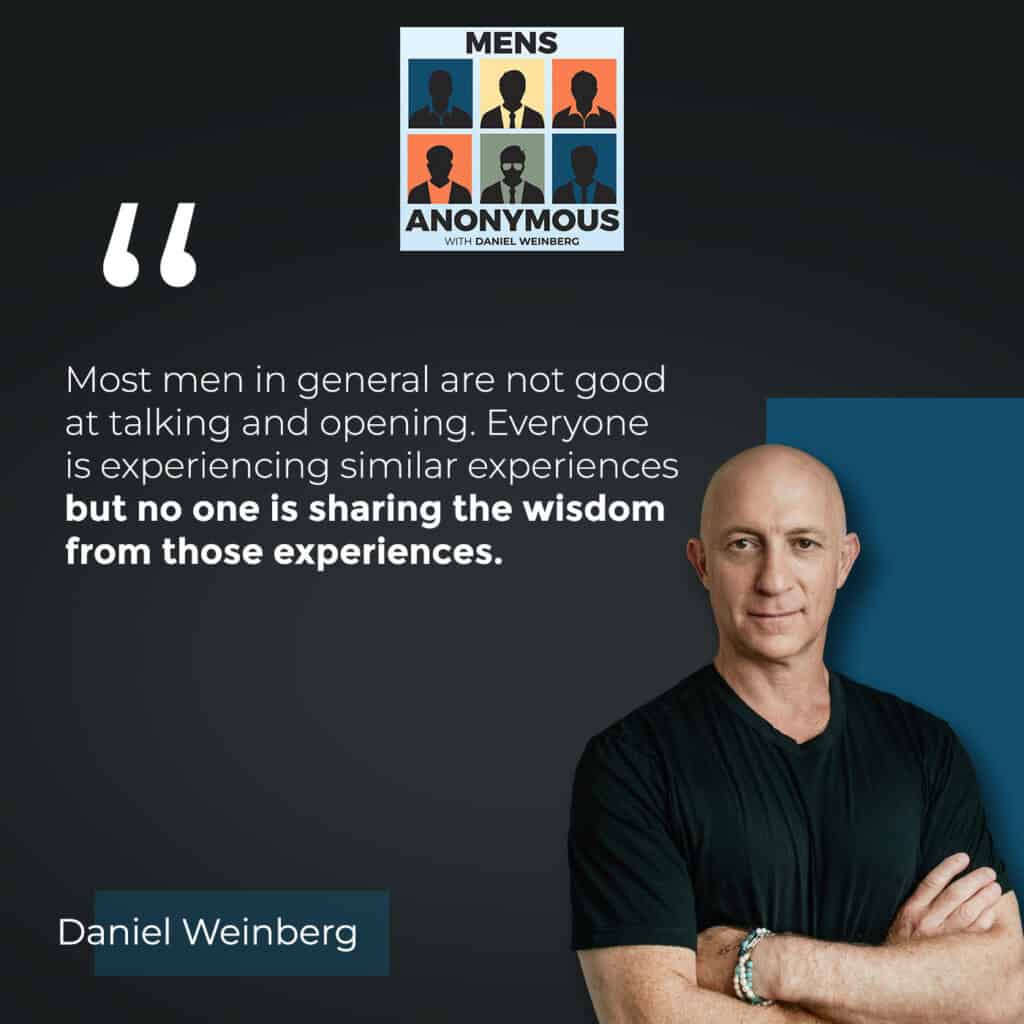
That’s it. We have this ability as men to compartmentalize, to dance around the outside of feelings. We can talk about the weather, and the sport until the cows come home, but to get into how am I feeling now? That’s where absolute power is. That’s where the truth emerges from. Now how am I feeling right now? I feel scared. I feel alone. I feel I haven’t got what it takes to do this. I feel like a failure. This stuff.
It’s not about the group going, “It’s okay. It’s going to be okay.” What can support that? Maybe there’s a, “Where’s the truth in that?” You get this gentle but important prodding from the rest of the group about what’s going on. Big shifts are happening. I nearly didn’t put this group together. I was in my head a fear of them won’t come, they won’t show up, they won’t take it seriously. I’m so wrong and I’m so pleased. I got some good nudges from some important people in my life to go, “Bitch, just do it.”
This is a very scalable exercise that you could roll out, and I generally think a lot of readers and men will be very keen to sign up for something like this. It makes a lot of sense.
I almost feel every man should have some group or tribe like this in their life. It doesn’t have to be an organized, paid-for men’s group. You need something. It’s beyond beer and football. It’s deeper than that. You can go in, maybe it’s a men’s circle, maybe it’s a group, maybe it’s AA or another anonymous type of group. It’s to have that space to do it.

The other thing I do while we are in groups is here in Ibiza, I run a monthly breakfast for men, which is physical together. We are all in the same restaurant together, and that’s been amazing. I took over a networking group with a couple of mates and we changed it. We said, “I don’t think the item wants this. The item wants this.” We went from fifteen guys banging on about their businesses and it was a bit boring. Then we changed it around at its lowest end. We only had five guys coming. We thought, maybe we have got it wrong, and now it’s grown to, we have got 100 hundred people in the community and we sell out. We only have 25 seats for each breakfast, and they sell out within an hour each.
When’s breakfast?
It’s the first Thursday of every month in Ibiza. Please come and join us when you are on the island. Regularity. The feedback we get from that is, guys, thank you for putting this together. It’s the most important thing I do every month. I have got family, I have got my business to look after and there’s all that weight. I can come here. I can be myself and we share a bit, and get that sense of, “I’m not on my own. This is the crucial thing I want to get across to any man, you are not by yourself.”
What’s the format of the breakfast?
The breakfast is, we are 25 guys. It’s quite a big group. We all get to share. We call it a 90-second share, and the key question we ask is, “Where are you at?” Not, “What do you do?” You can talk about your business or the new thing you are creating. You can talk about your family. You can talk about whatever. Where are you at?
Rapid-Fire Questions And Closing Words
To wrap it up, I usually do a set of five questions that I ask my guests. I’m going to shoot away. Who would you like to say sorry to be given the chance?
Let’s start with a deep one. Given the chance, I would say sorry to my mom. For the last three months of her life, I wasn’t around as much as I should. If I could change the time, which we can’t, I would have spent more time with her. That does still sit with me. I’d say sorry to her.
What are you proud of being or doing in your life?
I’m proud of the life I have created, and that’s being a father, being a good husband, and building a sustainable business here in Ibiza. That’s what I’m proud of.
When did you receive kindness whilst needing it most and expecting it least?
It’s going to be related to my mother and her passing. We had the funeral, and it was mostly her friends and family who came, but two of my best friends came, and I wasn’t sure they were going to come, and my stepbrother. My stepbrother and two of my best friends came, and having that support, because they were there for me, was like, “Wow.” I didn’t have any expectations, that whole self-reliance thing of mine was like, “No, you don’t have to come,” but I was so happy to see them. I needed that.
What did your mother or father teach you that you frequently remind yourself of?
Probably mostly from my mother, as I’ve explained. I spent most of my time with her. Good, solid values in life which is how to treat people. I saw a lot from her. She was a nurse, so she was a carer by design. That caring and kindness.
That’s like a real giving role, then. The last one, what is Richard’s superpower?
I’ve realized this in the last several years. It’s bringing people together as the host of a men’s group or a facilitator of a workshop and creating an experience that they want rather than forcing it if that makes sense. That generous host approach.
I can see that. It’s an absolute pleasure talking to you. What you are doing is phenomenal work. Keep on pushing that, and I genuinely think that anyone who would participate in any of your programs would benefit hugely. Even if it’s just turning up to one of these breakfasts. Doing such a program, you can’t lose. I genuinely think you can’t lose. I want to say thank you for doing what you are doing, and I love that you’re very passionate and in your flow. You’re doing it, which is the best place to be when you’re doing something like that because the participants are going to feel that energy.
It’s an energetic exchange. People know when you’re inauthentic. It comes across clearly. When you’re in your flow or when you’re authentic this is where I want to be. People feel that. That’s what I’m trying to get to. That’s where I want to be. Thank you for having me. It’s a pleasure. I love the chat. Great questions. Thank you for holding the space.
You want people to feel that you are always authentic. Share on XWe will catch up when I’m in Ibiza.
We will see you soon.
Important Links
About Richard Stokes

Richard is a highly regarded and qualified leadership coach who supports business leaders to positively influence & impact their world. He has a proven track record working globally with large corporations, ambitious start-ups and motivated individuals.
Richard draws from his 25 years of board-level business experience in the media and advertising industry to help clients to clarify and achieve their goals. His style is practical, positive and results- oriented. Richard believes we can create the change we want and leads with the mantra ”Slow Down, Go Deep, End Strong”.
As the host of The Mojo Podcast, Richard dives into compelling stories of resilience, change, and triumph. Through candid conversations with extraordinary individuals, he provides inspiration and practical insights for anyone seeking to transform their life. When he’s not coaching or podcasting, Richard enjoys life in Ibiza with his wife and two boys.

